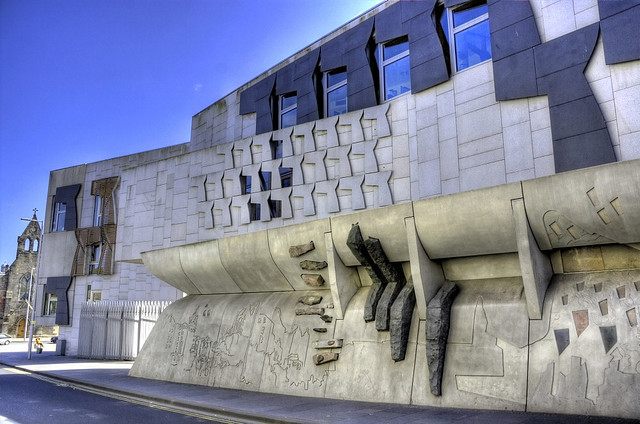Scotland’s draft interim constitution: clear-sighted and sensible, or an SNP power-play?
The Scottish Government recently published The Scottish Independence Bill: A Consultation on an Interim Constitution for Scotland, the document which would form the basis of the constitutional arrangements for Scotland in the event of a ‘Yes’ vote in the forthcoming independence referendum. Democratic Audit asked expert constitutional thinkers to give their views on whether the document is fit for purpose.
Professor Stephen Tierney, Director, Edinburgh Centre for Constitutional Law
 The interim constitution is short and clear. It also sets out a positive vision for Scotland. So I shouldn’t be churlish. But it contains a number of policy issues which, rather than being locked away in a constitution, should be left to the competence of an independent Scottish Parliament. And if we start with this as a template, the permanent constitution is likely to be even more detailed and policy-laden.
The interim constitution is short and clear. It also sets out a positive vision for Scotland. So I shouldn’t be churlish. But it contains a number of policy issues which, rather than being locked away in a constitution, should be left to the competence of an independent Scottish Parliament. And if we start with this as a template, the permanent constitution is likely to be even more detailed and policy-laden.
If Scots do take the momentous step of voting Yes in the referendum why not let the parliament of a new state find its own feet? Scottish nationalists dislike Westminster’s authority over Scotland, but let’s not blame parliamentary democracy for this. Parliament’s supremacy has been a flexible and democratic model. A danger is that this will be swapped for a constitution drafted by the most vocal vested interests and that judges will become the most important politicians in an independent Scotland.
If the people do vote Yes in September why not leave political power in their hands, to be exercised by their parliament and, for big decisions, by the people themselves through future referendums?
Professor Iain McLean, Nuffield College, University of Oxford
 Whereas Scotland’s Future was long and evasive, the Scottish Independence Bill and accompanying notes are short and to the point. This is the best document on independence yet released by the Scottish Government.
Whereas Scotland’s Future was long and evasive, the Scottish Independence Bill and accompanying notes are short and to the point. This is the best document on independence yet released by the Scottish Government.
The Bill opens ‘In Scotland, the people are sovereign’. It thus junks parliamentary sovereignty. Though it makes obeisance to the Declaration of Arbroath (1320), this is really the work of the late Lord President Cooper (MacCormick v. Lord Advocate 1953 SC 396 at 411), and the late Neil MacCormick, son of the 1953 petitioner. Lord Cooper destroyed the intellectual coherence of parliamentary sovereignty. Sir Neil drew the attention of his SNP colleagues (and everybody else) to the importance of that.
But popular sovereignty need not be unlimited. It is not in the USA because of the Bill of rights and other constitutional provisions. Nor would it be in an independent Scotland, because this Bill constitutionalises the Human Rights Act 1998. Scots Law may therefore not be inconsistent with the rights enshrined in the European Convention of human Rights. It must also not contravene EU law, which is another restriction on sovereignty.Unionists as well as nationalists should welcome such a clear-headed document as this.
Norman Bonney, emeritus professor at Edinburgh Napier University

The policy of the Scottish Government, outlined most coherently in Scotland’s Future, is not just to secure an independent Scotland, but also to secure one in which the Scottish National Party continues to control the Parliament and Government. Its ambitious, many would say, unrealistic, policies which are part of its independence plan, are the basis of the programme that it would put, in the event of a ‘yes’ vote to the Scottish people in the Scottish Parliamentary elections in 2016 thus hoping to extend its current place in power from 2007 at least until 2021.
In that interim period Scotland would be governed by a single chamber Parliament, possibly with an SNP majority government elected just prior to independence, with no counter-availing constitutional checks and balances – other than those provided, in the period immediately following a ‘yes’ vote, by the UK Parliament and Government in the bargaining over the terms of independence. But the SNP Scottish Government plans, even in advance of the conclusion of negotiations, to assume the constitutional powers reserved to the UK Parliament by the devolution referendum of 1997.
In the event of a ‘yes’ vote the liberties of Scottish citizens may well, paradoxically, depend on the ability of the UK Government and Parliament to ensure that there is ample protection embedded in the terms of the independence agreement – because the Scottish Government has no interest in checks and balances on it power in the formative immediate post-independence years.
Note: click here to see an extended version of Norman’s contribution
 Kyle Thornton, Chair of the Scottish Youth Parliament
Kyle Thornton, Chair of the Scottish Youth Parliament
If Scotland were to become independent, I would argue strongly we need a process which is inclusive of the whole population, especially our young people.
The guiding document of a new nation cannot be one which is Government-led. It must be from the people, for the people and approved by the people as a whole. It is an opportunity to set out our values and enshrine safeguards for our democracy and society and so we must take the time to debate and discuss what our constitution should say and crucially, that those left to draft a new constitution must be empowered to have a national conversation about what it is that a newly independent nation would want to see in its founding document
—
Note: this piece represents the views of the contributors, and not those of Democratic Audit or the LSE. Please read our comments policy before posting. The shortened URL for this post is: https://buff.ly/1i7T948






 Democratic Audit's core funding is provided by the Joseph Rowntree Charitable Trust. Additional funding is provided by the London School of Economics.
Democratic Audit's core funding is provided by the Joseph Rowntree Charitable Trust. Additional funding is provided by the London School of Economics.
Senators home jersey
Magic jerseys cheap Sizes Online
Scotland’s draft interim constitution: clear-sighted and sensible, or an SNP power-play? https://t.co/lC45eRLiV9 https://t.co/Z83GbLADJl
Scotland’s draft interim constitution: Clear-sighted and sensible, or an SNP power-play? https://t.co/7LZF0a7yNt
“Unionists as well as nationalists should welcome such a clear-headed document as this constitution”, says Ian McLean https://t.co/9sACcNEoFt
Scotland’s draft interim constitution: Clear-sighted and sensible, or an SNP power-play? https://t.co/tGBqMg4DYn